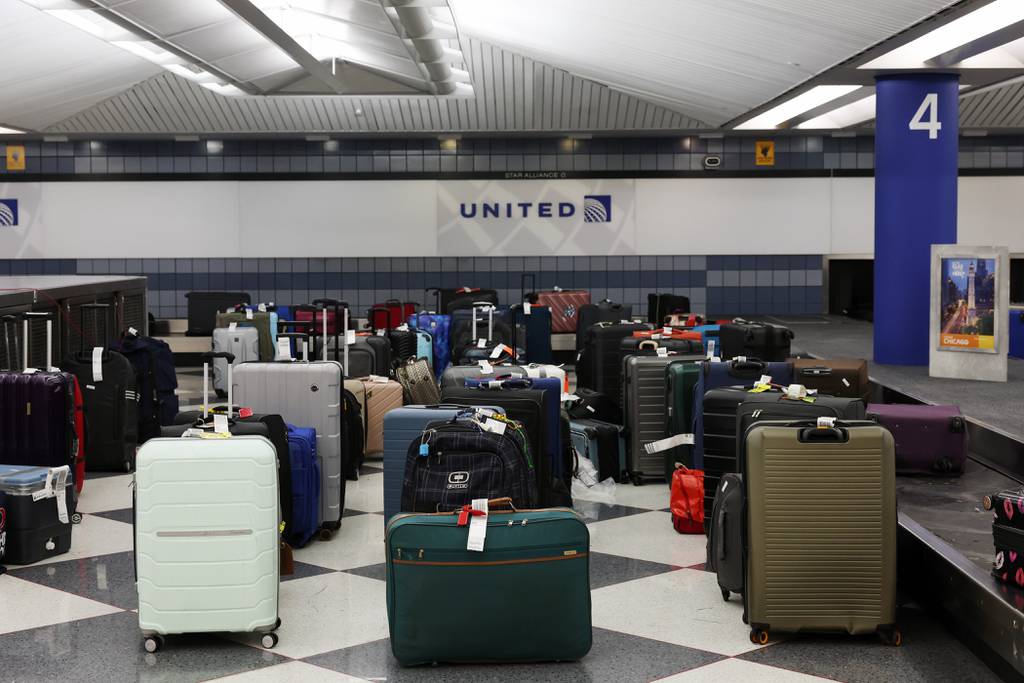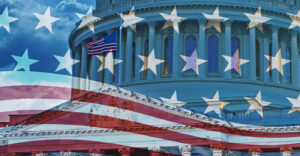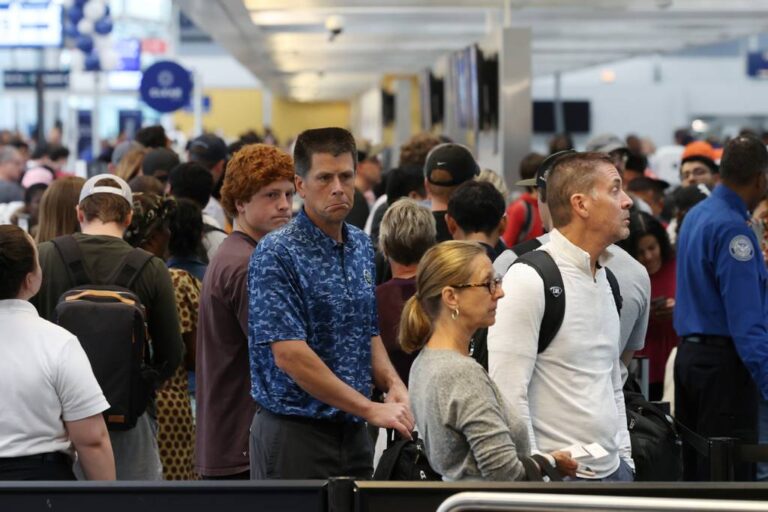Flight cancellations at O’Hare International Airport began to ease as the busy July 4 travel weekend got underway Thursday, after days of widespread cancellations in Chicago led by United Airlines.
United said it expected to be back on track for the holiday travel weekend, which the carrier is expecting to be its busiest since the start of the pandemic. But by Thursday afternoon, the airline still led O’Hare and the nation in canceled flights, according to flight tracking website FlightAware.
At O’Hare, United had canceled 78 flights scheduled for Thursday as of midafternoon, accounting for the majority of the airport’s flight cancellations, and more than 400 flights nationwide. Still, that was fewer canceled flights than the 138 scrubbed by United at O’Hare Wednesday and the 132 the carrier canceled Tuesday.
Thunderstorms in the Northeast throughout the week caused widespread cancellations, including at United, where it left flight crews out of place, the carrier said. That caused cancellations to ripple through the system to Chicago.
A string of other unlucky events may have also contributed to the nation’s flight woes throughout the week, said travel analyst Henry Harteveldt, including technical problems earlier in the week at an air traffic control facility that caused a ground stop at D.C.-area airports, where United has major operations, and weather elsewhere in the country.
“United has unfortunately had hubs in the wrong cities at the wrong time weather-wise, and that has really caused a disproportionate amount of disruption to its schedules and operations,” he said.
Katie Hurley Wales and her husband, Craig, were caught up in this week’s flight disruptions on several airlines, which caused her to miss an important work trip and left Craig Wales stranded in Canada.
Craig Wales and the couple’s 9- and 10-year-old daughters were set to fly to Toronto Wednesday morning for the girls to head to summer camp. But their American Airlines flight out of Chicago was delayed for hours, which caused Craig Wales to miss his Air Canada return flight home that evening.
With no change of clothes or toothbrush, he spent the night at a hotel near the airport. A rebooked flight was canceled, and the next flight Air Canada booked him on was for late Thursday night. He searched for a rental car but couldn’t find one available.
He and his wife were supposed to fly to Honduras early Thursday morning to attend the graduation of a high school supported by the organization Katie Wales’ runs, Brighter Children. With Craig stuck in Canada, Wales prepared to go alone, until the first leg of her United flight was canceled. The next available flight would not have gotten her into Honduras in time for the graduation.
“It’s a huge deal to see the work of this organization manifested in these kids,” she said.
Wales understands the situation, and is grateful that if she had to get stuck somewhere, it was at home rather than in an airport. United refunded her flight, and she is thankful they were able to find a hotel room for her husband, though Air Canada did not cover that cost, she said. And she is grateful for the support of her neighbors, who pitched in with offers of help.
“It’s really disappointing to miss it,” she said. “The kids will go on, they will graduate. I wish we could’ve witnessed it.”
Air travel challenges come as airlines and airports ramp up for a busy holiday travel weekend, with the busiest travel day at O’Hare expected Friday. At Midway Airport it’s expected to be Saturday.
About 1.5 million passengers were projected to travel through the two Chicago airports between Friday and July 5. At Midway, travel was expected to be slightly higher than in 2022, but at O’Hare it was expected to be down 1.7%.
United, for its part, expects O’Hare to be one of its three busiest airports over the holiday weekend, along with its other major hubs in Denver and Newark, New Jersey. The carrier is projecting the busiest day will be Friday, when more than 500,000 travelers are expected on the airline.
The recent travel challenges come after last summer’s sky-high demand, expensive fares, cancellations and delays. Then, in December, Southwest canceled thousands of flights as it struggled to catch up after a winter storm.
“Unfortunately, it was United’s turn to be hit by the ugly stick,” Harteveldt, the travel analyst, said.
Still, airlines this summer are unlikely to face the same challenges as last year, Harteveldt said. Airlines have ramped up hiring and are running flight schedules they can more realistically operate, he said.
United said it added 15,000 employees nationwide last year, and is on track to add 50,000 through 2026.
“I’m hopeful that what we are seeing is United turning the corner on what has been a terrible week for the airline,” Harteveldt said. “And, frankly, I hope all airlines are turning the corner on what has been a very bad several days.”
United CEO Scott Kirby has blamed the airline’s recent struggles at one of its major hubs, Newark, on a shortage of air traffic controllers in the New York City area, a criticism U.S. Transportation Secretary Pete Buttigieg has pushed back against while conceding that a key Federal Aviation Administration facility in New York is severely understaffed.

The union representing flight attendants blamed United’s challenges on staffing. Ken Diaz, president of the United chapter of the Association of Flight Attendants, said in a statement that “failure to properly staff crew schedulers, the flight attendant support team and more has exacerbated these operational issues and left passengers and Flight Attendants waiting for answers for hours at a time.”
In a statement Thursday, United said it was fully staffed in Chicago. The carrier said employees were working extra hours and it had increased staffing to restore flight attendant schedules, and it was offering triple pay to staff to pick up open trips.
“We’re seeing improvement across our operation,” United executives said in a statement. “It’s all-hands-on-deck as our pilots get aircraft moving, contact center teams work overtime to take care of our customers, and our airport customer service staff works tirelessly to deliver bags and board flights. As our operation improves in the days ahead, we will be on track to restore our operation for the holiday weekend.”
Another issue could be in store for travelers as soon as this weekend. Federal officials say some airline planes may be unable to fly in bad weather starting Saturday because of possible interference from new 5G wireless service.
American, United, Southwest, Alaska and Frontier say all their planes have been retrofitted with new radio altimeters — those are devices that measure the plane’s height above the ground — and they do not expect disruptions due to 5G service.
However, Delta Air Lines has about 190 planes in its fleet of more than 900 that have not been updated because it can’t get enough altimeters from its supplier. Delta says it will schedule those planes to avoid landing in poor visibility while it works to upgrade them through the summer.
Smaller airlines that operate regional flights could also be affected by the radio interference issue, as could flights operated to the United States by foreign carriers.
The Associated Press contributed.
sfreishtat@chicagotribune.com







